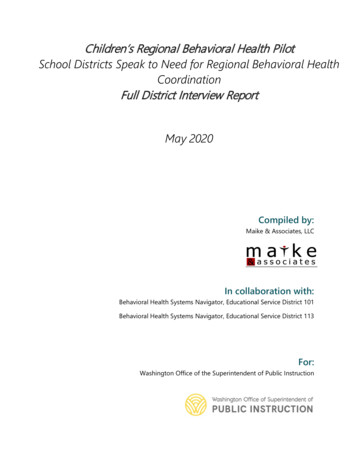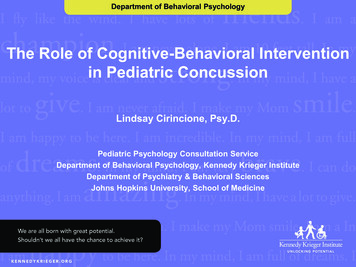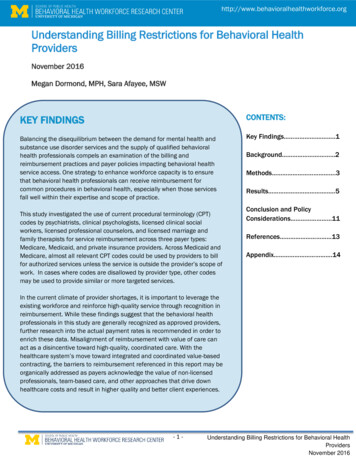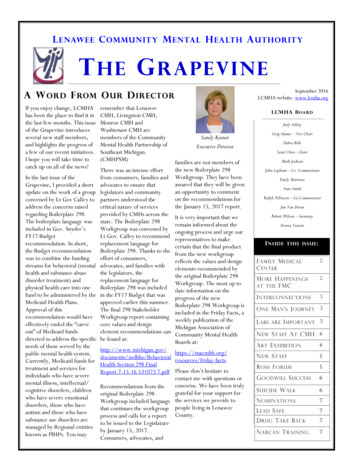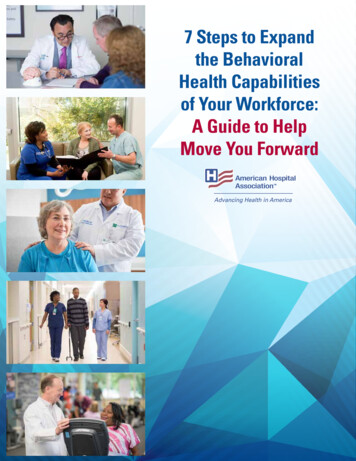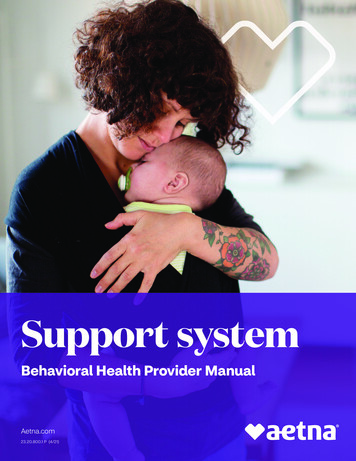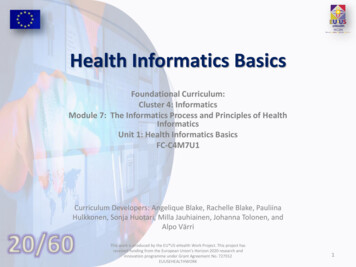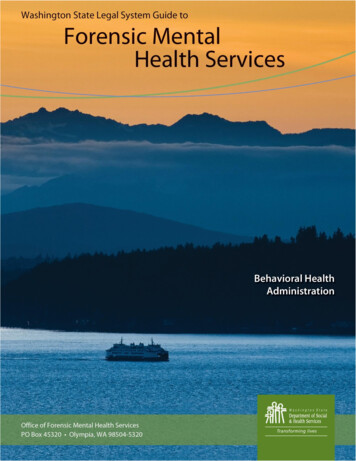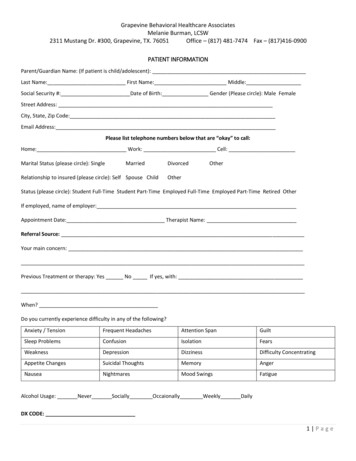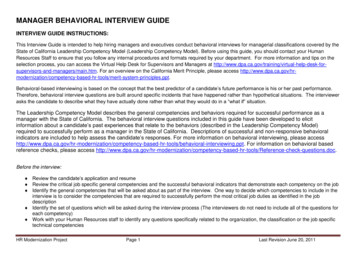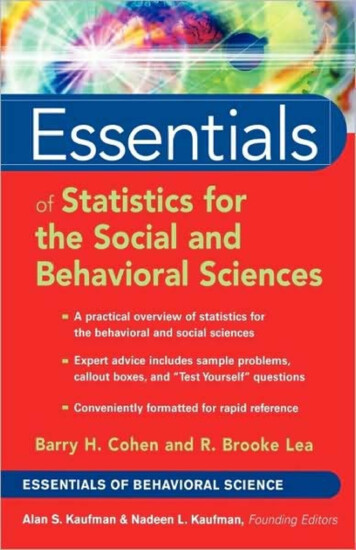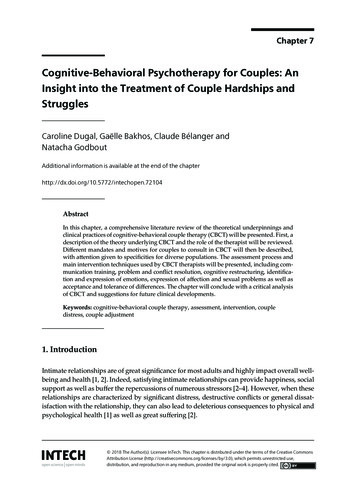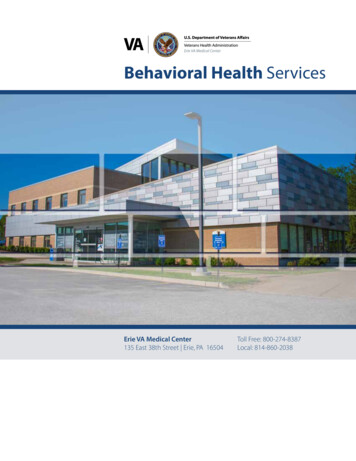
Transcription
Behavioral Health ServicesErie VA Medical Center135 East 38th Street Erie, PA 16504Toll Free: 800-274-8387Local: 814-860-2038
Erie VAMC Behavioral Health ServicesPost-Traumatic Stress Disorder (PTSD)The Erie VA’s Behavioral Health Clinic provides a wide range of services to help Veteransmeet their mental health and substance abuse recovery goals.In addition to individual therapy, group therapy, and medication management, theBehavioral Health Clinic offers programs to assist with crisis intervention, homelessness,employment, substance abuse, and so much more.The Erie VAMC Trauma Recovery Program is a specially designed outpatienttreatment program for Veterans. It follows a recovery model of care with the goalof reducing trauma symptoms while helping Veterans return to a meaningfullife. The PTSD Clinical team provides individual therapy that is evidence-based,meaning research shows these treatments are effective in treating PTSD.The Behavioral Health Clinic offers traditional hours, evening, and Saturday morningappointments. Certain services are also available in the Ashtabula, Crawford, McKean,Venango, and Warren Community Based Outpatient Clinics (CBOCs) either in-person orthrough telehealth.Through PTSD specialty care, Veterans will learn to: Understand the impact of trauma on daily life Recognize trauma triggersFor additional information or to self-refer and enroll in services, please call the BehavioralHealth Clinic at 814-860-2038 or 1-800-274-8387. Learn helpful ways to respond to trauma triggersHours of OperationMonday -Thursday 8:00 a.m. to 7:00 p.m.*Friday 8:00 a.m. to 5:00 p.m. Saturday 8:00 a.m. to noon**evening and weekend by appointment only Reconnect to important values Gain new perspective and meaningEvidence Based Therapies: Cognitive Processing Therapy teaches Veterans how to identify unhelpful thinkingstyles and learn the skills to create more balanced thinking, resulting in less distress. Prolonged Exposure involves talking about the trauma andengaging in activities that have been avoided. Eye Movement Desensitization and Reprocessing teaches body awarenessand coping skills that prepare the Veteran to process trauma memories. Cognitive Behavioral Conjoint Therapy for PTSD is a couple’s therapy option thatreduces PTSD symptom distress and strengthens relationship communication.Evidence-Based TherapyPrimary Care-Mental Health IntegrationThe Erie VA Medical Center has staff members trained toprovide evidence- based psychotherapy (EBP) to Veterans.EBPs are therapies that have been demonstrated to beeffective through research studies. They are effective, goaloriented, time-limited, and have lasting benefits.The Behavioral Health Lab program provides telephone-basedmedication monitoring and support to help patients understandtheir symptoms. A registered nurse will work with a psychiatrist tooffer suggestions for medication and care adjustments as needed. Social Skills Training improves skills for managinghealth, conflict, relationships, and work Cognitive Behavioral Therapy (CBT) explores the relationshipbetween thoughts and emotions, and focuses on changingthoughts and behaviors in order to improve mood. CBTtherapy is also offered for chronic pain and insomnia Acceptance and Commitment Therapy focuses on managingthoughts and feelings that overwhelm our sense of wellbeing by helping Veterans overcome struggles with emotionalpain and commit to what matters most in their lives Interpersonal Therapy focuses on improving mood bysupporting positive relationships and addressing relationshipproblems caused by life changes, grief, and other issues Problem Solving Therapy helps Veterans recover fromdifficult life situations by teaching coping skills to deal withmajor life circumstances and chronic daily stressors Integrative Behavioral Couples Therapy improves relationshipsby helping couples accept and tolerate each other’s differencesConfidentialityBehavioral health services are confidential. We will not talk to anyoneabout information you share unless you give written consent.Under federal law, a few exceptions to this rule exist. If you havequestions, please ask your behavioral health provider.Primary Care-Mental Health Integration (PC-MHI)works with your primary care team to meet yourmental health needs right in Primary Care. PC-MHI clinicians are co-located in Primary Careand provide assessments and brief solution-focusedinterventions to Primary Care patients PC-MHI staff can help with common concerns like stress,anxiety, feeling down, irritability, and trouble sleeping Services are available the same day as theVeteran’s Primary Care appointment“We are humans who makemistakes, but there is hope.There is hope and help hereat the Erie VA.”–Local Veteran Erie VAMC PatientSubstance Abuse (SA) Individual therapy to assist Veterans torecognize strengths, identify motivationfor change, and offer referrals to moreintense programming, as needed Cognitive-Behavioral Therapy forSubstance Abuse Disorders (CBT- SUD)is an evidence- based therapy forVeterans wanting to reduce or abstainfrom substances. Treatment involvesweekly sessions focused on managingcravings and urges, refusal skills, buildingsober supports, and managing mood The Intensive Outpatient TreatmentProgram (IOP) provides group therapyin an intensive treatment approachsimilar to residential substance abusefacilities on an outpatient basis Behavioral Couples Therapyfor Substance Abuse Disorders(BCT- SUD) is an evidenced basedtherapy for married or cohabitatingcouples who are experiencingproblems in their relationshipbecause of drugs and/or alcohol Detox services include outpatientdetox from alcohol, benzodiazepines,and opiates as well as limitedinpatient detox services Medication management, to includeSuboxone and oral Naltrexone,are offered in conjunction withindividual therapy, when appropriate.Naloxone, an opioid reversalmedication, is also available.
Homeless CareRANGE: Case ManagementThe PRRCThe Homeless Care Team’s goal is to end homelessness among Veteransthrough outreach efforts and community partnerships.The Rural Access Network for Growth Enhancement (RANGE)program provides behavioral health intensive case managementto Veterans with serious mental illness living in the ruralcounties of Crawford and Venango. The aim of RANGE is toassist Veterans with serious mental illness in their recoveryjourney by increasing functioning in their community.The Psychosocial Rehabilitation and Recovery Center (PRRC) offerseducation, skills training, and support in the form of groups. Sometopics include strength-based recovery, anger management,stress management, substance abuse, and social skills.Who is eligible? Veterans who are homeless or at imminent risk of becoming homeless. Withthe exception of the Grant & Per Diem program, Veterans must be eligible for VA services.Programs include: Grant & Per Diem Housing: A transitional housing program whereVeterans focus on the development of life skills necessaryto address the issues that led to homelessness Recovery support for physical and mental health Treatment plan development Housing Choice Voucher/HUD-VASH: The Department of Housing andUrban Development and the Department of Veterans Affairs SupportedHousing (HUD VASH) program assists eligible homeless Veteransand their families with case management support and permanenthousing through Section 8 housing vouchers. This program is incomebased & requires active participation in case management. The Veteranis responsible for paying utilities and 30% of their income toward rent Contract Emergency Shelter Services: Short term emergency shelter placementand case management support is available at a local shelter Homeless Employment: Veterans who are working with the Homeless Care Teamcan work with an Employment Specialist who can assist with job development Transportation to appointments that would have beenotherwise missed due to lack of transportation Learn about the nature and treatment of mental illness Crisis planning and intervention Find ways to prevent relapses and re- hospitalizations Social skills training Learn to cope successfully with symptoms Assessment and monitoring. Gain more control over their own treatmentand improve the quality of their lives To be eligible for RANGE services, Veterans musthave one of the following diagnoses: Schizophrenia Schizoaffective Disorder Bipolar Disorder Major Depression PTSDPsychosocial Residential and Rehabilitation Treatment Program (PRRTP)The PRRC is open Monday through Friday from 9:00 a.m. to noon.To help Veterans in their recovery, they are asked to commit toattending at least 3 days a week. The PRRC is available to anyVeteran who is experiencing a significant mental health issue thatis having a serious impact on their social, work, or educational life. Any severe or chronic mental health conditionThe Psychosocial Residential Rehabilitation Treatment Program (PRRTP) is an 8-bed residential treatment program located in the east wing ofthe 6th floor of the Erie VA Medical Center. The program cares for male Veterans who need to live in a program while receiving treatment formental health and/or substance use disorders. The program is NOT for Veterans who require inpatient care, are acutely ill, or who are a dangerto self or others. PRRTP follows a recovery model empowering Veterans to achieve their goals and maintain their highest level of functioning. Feel more confident in the communityand in pursuing their goals in lifeMilitary Sexual Trauma (MST)Military Sexual Trauma (MST) refers to sexual assault or sexualharassment experienced during military service, even while offduty and/or off base. Veterans of all genders and from all types ofbackgrounds have experienced MST.The Erie VA has a Military Sexual Trauma Coordinator. If you havequestions about MST or about your healthcare appointments relatedto MST, please call the Erie VA Behavioral Health Clinic and ask tospeak with the MST Coordinator.Peer SupportA Peer Support Specialist is a Veteran with a current or past mentalillness experience who has gone through the recovery process andhelps other Veterans diagnosed with mental illnesses. Peer Supportscan share personal experiences with their diagnoses and also theirmilitary experience to help other Veterans in their recovery path.Each Peer Support has their own story of traumas and strugglesrelated to their military experience and can relate to Veteransbecause they have “been there” themselves. In addition to individualservices, Peer Supports also facilitate a number of groups.Veteran “X”Veteran “X” is a behavioral health group program which focuseson a fictitious individual with a written ongoing scenario. Veteran“X” struggles with an abundance of social issues that are noteasily resolved in today’s society, where resources are limited.This peer-led program enhances one’s hope that their ownrecovery can be achieved by setting long-term goals and byworking through them in a team spirited concept. As the groupassists Veteran “X” in resolving and overcoming the many socialissues that individuals face daily, group participants begin to findresources and tools that assure their own pathway to recovery.Veteran Behavioral Health CouncilThe Erie Veteran Behavioral Health Council is an independent entity, comprised of Veterans, and recognized by the Erie VA as such for assistingVeterans who receive benefits and services. The BH Council participates in outreach events in the community, and offers information to otherVeterans regarding benefits and programs available to them. They listen to VA employees from varying departments, offer ideas from a Veteranconsumer perspective, and aim to enhance Veteran recovery. The BH Council’s mission is to enable and empower Veterans to achieve theirgreatest degree of independence.The BH Council is open to Veterans from all eras and branches of service. Meetings take place at the Erie VA Behavioral Health building everythird Thursday of each month from 11:30 a.m. to 1:00 p.m. If you are interested in learning more, or joining a meeting, please call the Erie VABehavioral Health Clinic and ask to speak to the Local Recovery Coordinator.
Crisis Intervention and Suicide PreventionVeterans Justice Outreach (VJO)The purpose of the VJO initiative is to avoid unnecessarycriminalization of mental illness among Veterans.The VJO Coordinators focus on three areas: Community education: Provides information and education about Veterans’ issuesand the services available. This is targeted toward law enforcement and correctionsagencies, courts, human service agencies, and organizations serving Veterans. Finding and enrolling Veterans: Develops communicationwith jails to identify Veterans who are incarcerated whileadvocating for and connecting the Veterans to care.Every Veteran suicide is a tragedy and the VA is committed to offeringcrisis intervention services 24/7 to ensure that Veterans and theirfamily members can get help when needed. The Erie VA employsthree Suicide Prevention Coordinators who offer a variety of services: National Veteran’s Crisis Line follow up Crisis response and assessment of suicidal Veterans Connect Veterans to mental health and other health care services Comprehensive suicide risk assessments and safety planning Care management services for high risk Veterans Counseling on lethal means restriction Community outreach Veteran, family, community, and VA employee education Liaison services: Works with Veterans Treatment Courts, MagisterialDistrict Courts, and Common Pleas to improve awareness ofVeteran specific issues and the care the VA can offer.The VJO Coordinators can:Veterans Employment Services Assess Veterans’ health care needs, identify appropriate VA and non-VA servicesVeterans Employment Services areavailable for Veterans who are activelyengaged in the Behavioral HealthClinic and/or homeless services. Refer and link Veterans to comprehensive health care servicesThe Compensated Work Therapy (CWT)program is a vocational rehabilitationprogram that aims to match work-readyVeterans with competitive job opportunities,assisting them in meeting their mentalhealth recovery goals. To be eligible forCWT, Veterans must be active with theBehavioral Health Clinic. The two CWTprograms available at the Erie VA include: Transitional Work Experience (TWE):a pre- employment program thatmatches Veterans with a workassignment at the VA Medical Centeror in the community for a limitedamount of time. The program assistsVeterans by providing employmentexperience while they work towardobtaining competitive, communitybased, permanent employment. Supported Employment (SE): a programdesigned to help Veterans with seriousmental illness obtain and maintainmeaningful work in the community.Homeless Employment Services: Veteranswho are working with the Homeless CareTeam who are interested in employmentcan work with the Homeless VeteransCommunity Employment Specialist (HVCES)who can assist with job development. With Veteran consent, communicate with law enforcementand corrections on treatment progress Function as a court team member including assessingthe needs of Veterans as impacted by court Connect court-monitored Veterans to evidence-based treatmentTo access crisis intervention services: Call the Veterans Crisis Line at 800-273-TALK (press 1) or the BehavioralHealth Clinic at 814-860-2038. After normal business hours, the Behavioral Health on-call clinician can be reached bycalling 800-274-8387.IF A VETERAN IS IN IMMEDIATE DANGER, CALL 911.“The VA is a fantastic place for recovery, and I want totell other Veterans: Don’t be afraid to ask for help.”–Local Veteran Erie VAMC Patient
If you are or know of a Veteran in crisis, contact the Veterans Crisis Line forconfidential support 24 hours a day, 7 days a week. You are not alone.Call 1-800-273-8255and press 1Text 838255
Cognitive Behavioral Therapy (CBT) explores the relationship between thoughts and emotions, and focuses on changing thoughts and behaviors in order to improve mood. CBT therapy is also offered for chronic pain and insomnia Acceptance and Commitment Therapy focuses on managin
